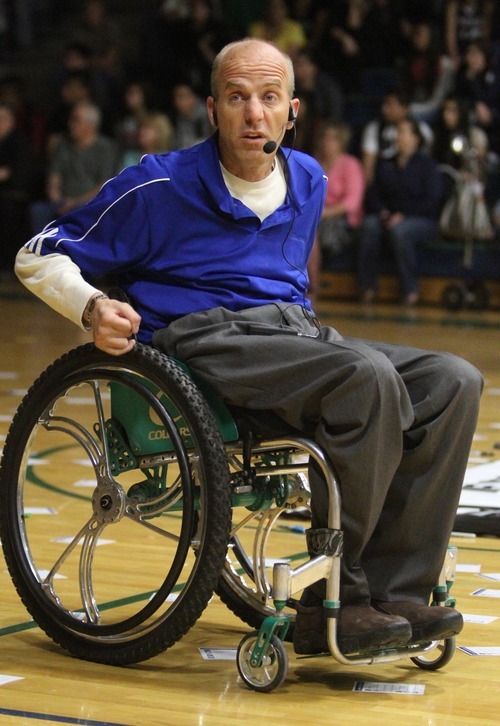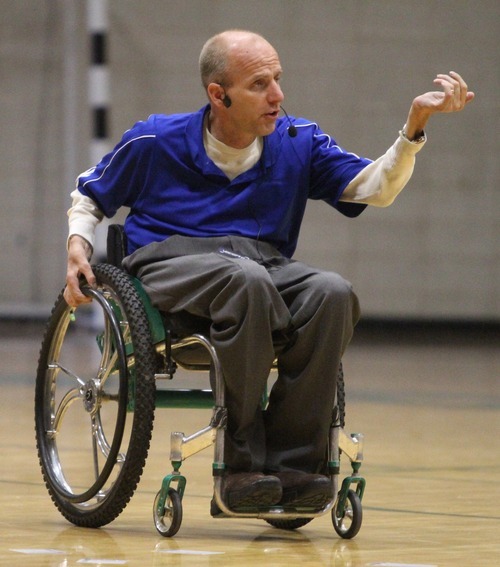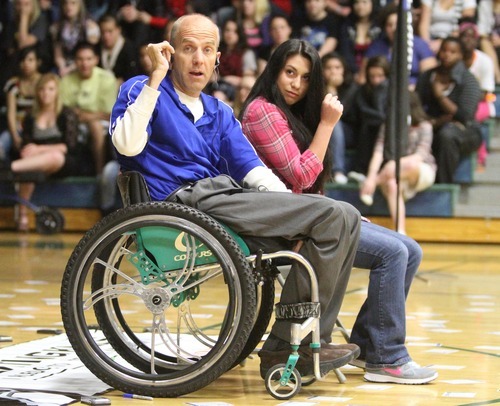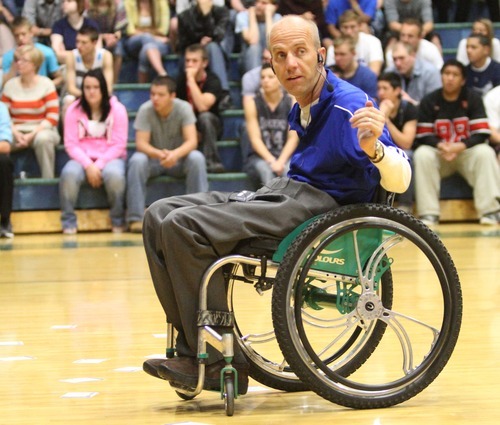This is an archived article that was published on sltrib.com in 2012, and information in the article may be outdated. It is provided only for personal research purposes and may not be reprinted.
More than 1,000 students at the Copper Hills High School gym fell nearly silent as Chad Hymas spoke about the pain that can ripple out from a single choice.
Too many of those teenagers have been touched by tragedy. Since last year, five Copper Hills students have died from causes ranging from car accidents to alcohol poisoning, and two others have suffered serious injuries.
"All I'm asking you to do is leave here and make good choices," Hymas said. A passionate speaker given to punctuating his thoughts with exclamations like, "We've got to hit this hard," Hymas used his life story as an inspiration and a cautionary tale.
The 38-year-old was paralyzed 10 years ago when a 2,000-pound bale of hay fell on his tractor in Tooele County. He'd seen the flash of the red light indicating the machine's hydraulic fluid was low, but he was in a hurry to get home — his wife had just called to say their baby son was taking his first steps.
"I ignored the red flashing light," he said, equating that light to other warning signs of bad decisions, in particular texting while driving.
"We've got a challenge with technology," Hymas said. "I see adults in the car texting while driving all the time."
In fact, in a separate study released by State Farm Insurance on Thursday, only 35 percent of 14- to 17-year-olds said they "strongly agree" that sending text messages behind the wheel could get them killed. Contrast that with 57 percent who feel that way about drinking and driving.
Sponsored by Rio Tinto/Kennecott Utah Copper, Hymas is planning to speak at 28 Utah high schools. Copper Hills was his second; the rest should come after this school year.
To show how distracting texting can be, Hymas put one student on a big-screen driving simulator and asked her friends to send her text messages. He asked other students to leave their thumbprint on a banner bound for the school cafeteria as a pledge not to text and drive.
Hymas isn't shy about using his body to make his point. As he spoke, he asked a student to describe his hand.
"See how my fingers are curled? It's because they're paralyzed," he said.
"Please take a hard look at this," he said, his hand on his wheelchair, "and think about your choices."
After his neck was broken, Hymas had to relearn how to dress himself (which he's proud to say now takes him less than two hours), as well as how to brush his teeth, type and shave — all of which he's learned to do with the aid of duct tape.
Along the way, he and his wife, Shondell, also adopted a third child, a little girl, and he began traveling the world as an inspirational speaker.
He still lives in West Jordan, in the Copper Hills district. Last year, Hymas said, six teens were killed in Utah in texting-while-driving crashes, while more than 30 were seriously injured in distracted-driving crashes. Hymas's words brought back recent, awful memories for Copper Hills senior Gerardo Toribio.
His 17-year-old friend Jose Ceballos died last January after a truck he was in crashed just outside the school. Both young men were on their way back from volunteering at an elementary school through Latinos in Action.
"It gave me flashbacks from what happened. … I was in shock," he said. What Hymas said "made a lot of sense. I'm proud of him."
Twitter: @lwhitehurst













